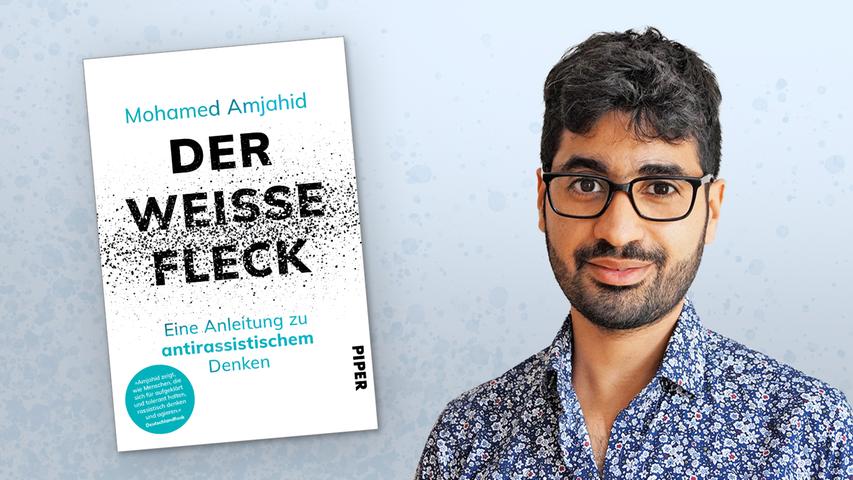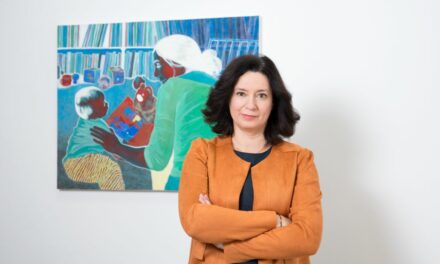Mohamed Amjahid, scholarship holder of the far-left Heinrich Böll Foundation, writes about systemic racism in Germany.
In 2021, the book "Der weiße Fleck" was published by the Munich publisher Piper Verlag.
The author of the volume is Mohamed Amjahid, a thirty-three-year-old German journalist who himself comes from a family with an immigrant background - with Moroccan roots. He was born in 1988 in Frankfurt, West Germany. He moved to Morocco with his parents and two brothers in 1995, where he completed his primary and secondary education. In 2007, at the age of nineteen, he returned to Germany, where he graduated in political science at the Free University of Berlin in 2014. Amjahid received the Thomas Mann House university scholarship associated with the Open Society Foundations.
The new volume does not bring anything new in that it fits well into the contemporary (official) discourse on racism in Germany, and based on its subtitle, it intends to provide a kind of guidance for anti-racist thinking. The word Fleck itself in the title can mean a stain, i.e. a dirty spot, a different color, a different point, a spot, a place, a bit like the English word spot, with a meaning that refers to a mistake - resulting from the difference. In addition to this, white is used as an adjective in the title of the book.
The author also raises the responsibility of those who consider themselves socially alert and enlightened, who act in such a way as to "not see skin color", since in this context all values are supposed to be neutral; at the same time, they do not want to notice that they too move in a society that systematically puts minorities at a disadvantage. Racism does exist, Amhahid believes, and recognizing and admitting that they are on the privileged side of a system that is unfair in many ways could be the first important step on the right path.
Amjahid tries to describe mechanisms of how he thinks it works when white people also face the problem of racism. Many of the members of the white-German majority society try to enter it into a race of victims and portray themselves as truly discriminated against in order to extract a little solidarity for themselves. And to make their situation a little better, which is actually rich in privileges - the author of the book explains.
According to Amjahid, history could have turned out the other way around, that is, the whites could also have fallen victim to colonization and slavery. But it didn't happen that way: the practice of the past centuries led to the point that because white people are used to it, "they don't even talk about their whiteness in the first place." Accordingly, the members of the German majority society also expected that their position and structural privileges could not become a subject of debate. But when that happens—as it increasingly does these days—the result is a defensive stance by which these people dismiss criticism of their own privilege. Regarding the author's opinion, we can note that in the light of the state of the German public today, such summary statements can at least be classified as excessive.
Amjahid's basic position on the issue is well illustrated by one of his statements. Last year, for example, he spoke to the German press about what he believed to be a close relationship between the Christian Democrats and the extreme right. He believed that there are not only similarities, but also a regular exchange of ideas between CDU and AfD politicians. Such an opinion may seem strange, even surprising, in relation to the CDU, which according to many is moving more to the left.
The author links the problem of terrorist acts based on hate primarily to German right-wing extremists, and the example of the terrorist attack in Hanau in February 2020 shows, in his opinion, how all this is connected to (anti-foreign) racism. According to him, the problem is that in the German majority society, harmful patterns of thinking have solidified in the minds of the citizens. Based on the image suggested by Amjahid, it seems as if Germany has not made any progress in 70 years, and the majority of Germans do not seem to know what to do with the "others", the non-whites, just like in the 1950s East Germany, when they appeared en masse the first strange-looking Turkish people in the country with big mustaches.
CDU politician Friedrich Merz, who could not succeed Annegret Kramp-Karrenbauer in the presidency of the Union Party this January, expressed his opinion on the Leitkultur concept in connection with the issue of migration as early as 2000, as Bundestag faction leader. The essence of his position was that the immigrants who came to Germany - already in the millions, mostly Turks who have lived there for decades - must adapt, so for example the "mastery" of the German language and the norms laid down in the Basic Law is also fundamentally necessary, even essential for peaceful and lasting coexistence for living. To put it another way, and in response to the points raised in the book: the immigrants, who are still a minority today, cannot count on the fact that their cultural situation and basic attitudes, as well as their perceptibly existing structural privileges, cannot become a subject of debate.
At the same time, the appeal to the colonialist and war crimes committed by the white man in the past centuries will not stop in any way, since today's generations cannot be held responsible either for the colonization of Africa in the 19th century, or for the fascist and national socialist acts of the 1930s and 1940s, and unfortunately the idealism of the latter systems it is rather as if the millions of immigrants imported to Europe - of Muslim religion or identity - seem to live on in the masses.
Joint learning of anti-racist thinking is at least a two-way game, i.e. it requires both sides: the immigrants (translated: non-whites) and the majority (simplified: whites) with mutual openness, with a clear indication of the intention to learn and acquire values. This can help ensure that Germany does not become a "salad bowl", but strengthens itself as a European culture based on the values of Christianity and humanism, while also proudly retaining and assuming its traditional identity, through its various communities. So that it does not become a time bomb (or Zeitbombe) that can explode at any time... Unfortunately, among those who read Amjahid's book, many cannot get closer to understanding why and how it is necessary to change the injustices experienced in the community in many ways - and the volume does not dare to ask the complicated questions, the honest answers of which could perhaps bring us closer to this.
Author: Zoltán Lomnici Jr., constitutional lawyer
Source: alaptorvenyblog.hu
Cover image: Cover of Mohamed Amjahid's book "Der weiße Fleck"












